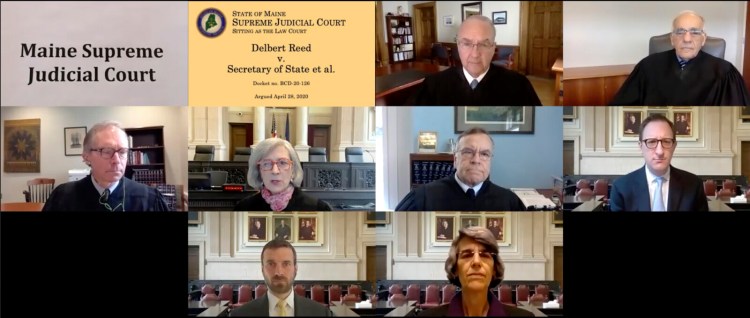Attorneys clashed over disputed petitions needed to put a $1 billion hydropower transmission project to a statewide vote Tuesday in the first Maine Supreme Judicial Court arguments delivered via video conferencing.
Backers of the New England Clean Energy Connect contend Secretary of State Matthew Dunlap misinterpreted state law when he accepted petitions notarized by people who also performed other work for groups that were collecting signatures.
If the court agrees, then the number of certified signatures would fall short of the threshold of about 63,000 needed for the November ballot.
The legal proceeding during a global pandemic marked the first time attorneys were not present for oral arguments delivered to Maine supreme court, said Amy Quinlan, spokeswoman for state courts. The justices were located in Portland and Augusta, while attorneys delivered arguments from their offices or from home.
The high court was asked Tuesday to determine the intent of the Legislature when it changed the law governing the role of notaries in petition-gathering campaigns.
Nolan Reichl, attorney for backers of the project, said lawmakers wanted to ensure that those who notarize signatures are not also aiding the petition drive at any time during the process.
“The guiding star by which the court navigates problems of statutory interpretation always has been the intent of the Legislature,” he said from his home. In this case, the secretary of state’s interpretation “contravenes the legislative intent,” he said.
But Assistant Attorney General Phyllis Gardiner, arguing on the secretary of state’s behalf from a conference room in Augusta, said election officials cannot retroactively revoke a notary’s authorization for actions that the notary took after an oath was legally administered.
All told, the secretary of state found that referendum supporters exceeded the threshold for the November ballot by 3,050 signatures; invalidation of the petitions at the center of the lawsuit would leave the referendum short of necessary signatures.
CMP’s New England Clean Energy Connect calls for construction of a 145-mile transmission line to bring 1,200 megawatts of electricity from Hydro-Quebec to the New England power grid to meet Massachusetts’ clean energy goals. Most of the transmission line would follow established utility corridors, but a new swath would be cut through 53 miles of wilderness owned by CMP.
The project was embraced by Massachusetts officials after New Hampshire regulators pulled the plug on the controversial Northern Pass project.
Supporters say the Maine project would reduce greenhouse emissions and stabilize utility rates across the region. Critics say the environmental benefits have been overstated and that the project would snuff out smaller wind turbine and solar projects in Maine.
The arguments on Tuesday were the first since Chief Justice Leigh Saufley departed to become dean of the University of Maine School of Law.
Absent from the video hearing was acting Chief Justice Andrew Mead, who recused himself from the case. Justice Ellen Gorman told the attorneys that the supreme court would rule “expeditiously.”
Send questions/comments to the editors.



Success. Please wait for the page to reload. If the page does not reload within 5 seconds, please refresh the page.
Enter your email and password to access comments.
Hi, to comment on stories you must . This profile is in addition to your subscription and website login.
Already have a commenting profile? .
Invalid username/password.
Please check your email to confirm and complete your registration.
Only subscribers are eligible to post comments. Please subscribe or login first for digital access. Here’s why.
Use the form below to reset your password. When you've submitted your account email, we will send an email with a reset code.